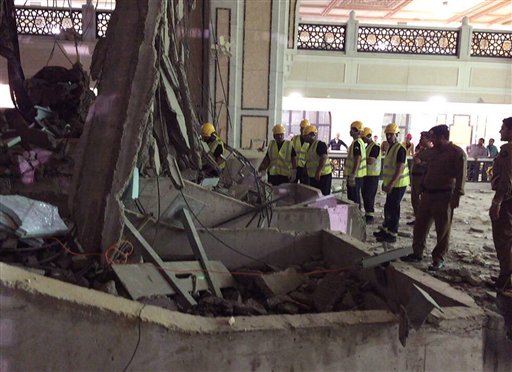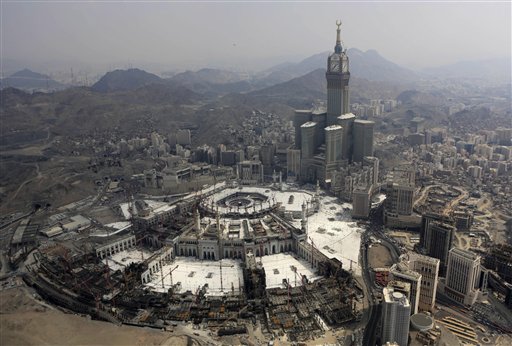
In this image released by the Saudi Interior Ministry’s General Directorate of Civil Defense, Civil Defense officials inspect the damage at the Grand Mosque in Mecca after a crane collapsed killing dozens, Friday, Sept. 11, 2015. The accident happened as pilgrims from around the world converged on the city, Islam’s holiest site, for the annual Hajj pilgrimage, which takes place this month. AP
JEDDAH, Saudi Arabia—A massive construction crane crashed into Mecca’s Grand Mosque in stormy weather on Friday, killing at least 107 people and injuring 238, Saudi authorities said, days before the annual hajj pilgrimage.
The civil defense agency said on Twitter that emergency teams were sent to the scene after a “crane fell at the Grand Mosque,” one of Islam’s most revered sites.
That came about an hour after it tweeted that Mecca was “witnessing medium to heavy rains,” and pictures on social media showed lightning.
Ahmed bin Mohammad al-Mansoori, spokesman for the two holy mosques, was quoted by the official Saudi Press Agency as saying part of a crane collapsed at 5:10 p.m. (1410 GMT) “as a result of strong winds and heavy rains.”
Abdel Aziz Naqoor, who said he works at the mosque, told AFP he saw the crane fall after being hit by the storm.
“If it weren’t for Al-Tawaf bridge the injuries and deaths would have been worse,” he said, referring to a covered walkway that surrounds the holy Kaaba and broke the crane’s fall.
The Kaaba is a massive cube-shaped structure at the center of the mosque towards which Muslims worldwide pray and which has a major role in the hajj.
Pictures of the incident on Twitter showed bloodied bodies strewn across a courtyard where the top part of the crane, which appeared to have bent or snapped, had crashed into the building which is several storeys high.

In this Sunday, Oct. 5, 2014 file photo, the Abraj Al-Bait Towers with the four-faced clocks stands over the holy Kabaa, as Muslims encircle it inside the Grand Mosque during the annual pilgrimage, known as the hajj, in the Muslim holy city of Mecca, Saudi Arabia. Saudi Arabia’s civil defense authority says dozens of people have been killed after a crane collapsed on the Grand Mosque in the holy city of Mecca on Friday, Sept. 11, 2015. AP
A video on YouTube showed people screaming and rushing around right after a massive crash was heard and as fog engulfed the city.
The incident occurred as hundreds of thousands of Muslims from all over the world gather for the annual hajj pilgrimage expected to begin on September 21.
The Grand Mosque is usually at its most crowded on Fridays, the Muslim weekly day of prayer.
Many faithful would have been gathered there ahead of evening maghrib prayers, which occurred about an hour after the tragedy.
Pleas to donate blood
The governor of Mecca region, Prince Khaled al-Faisal, has ordered an investigation into the incident and was heading to the mosque, the official @makkahregion page on Twitter said.
Irfan al-Alawi, co-founder of the Mecca-based Islamic Heritage Research Foundation, compared the carnage to that caused by a bomb.
He suggested authorities were negligent by having a series of cranes overlooking the mosque.
“They do not care about the heritage, and they do not care about health and safety,” he told AFP.
Alawi is an outspoken critic of redevelopment at the holy sites, which he says is wiping away tangible links to the Prophet Mohammed.
Online activists created a hashtag on Twitter urging Mecca residents to donate blood at hospitals in the area.
No details were immediately available on the nationalities of the victims.
Iran’s official IRNA news agency, quoting the head of the Hajj Organisation, said 15 Iranian pilgrims were among those injured.
In this image released by the Saudi Interior Ministry’s General Directorate of Civil Defense, Civil Defense officials inspect the damage at the Grand Mosque in Mecca after a crane collapsed killing dozens, Friday, Sept. 11, 2015. The accident happened as pilgrims from around the world converged on the city, Islam’s holiest site, for the annual Hajj pilgrimage, which takes place this month. AP
Most of them were treated as outpatients, Saeid Ohadi said.
A massive project is underway to expand the area of the mosque by 400,000 square meters (4.3 million square feet), allowing it to accommodate up to 2.2 million people at once.
Though marred in the past by deadly incidents including floods, stampedes and fires, the hajj has become nearly incident-free in recent years because of multi-billion dollar investments.
These have included transport networks and other infrastructure to facilitate movement of the crowds.
SPA said that almost 800,000 pilgrims had arrived by Friday for the hajj, which all able-bodied Muslims are expected to perform if they have the means to do so.
Last year, just over two million people took part.
Originally posted: 02:47 AM September 12th, 2015

